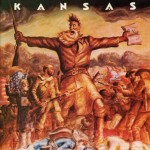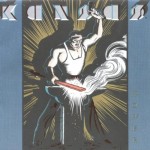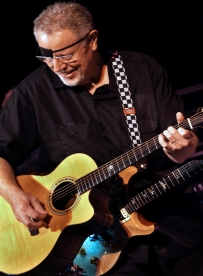In the 1970’s, Kansas arguably achieved a level of popularity that was unmatched by any other American progressive rock band, thanks to radio-friendly songs like “Dust in the Wind”, “Carry On Wayward Son”, and “Point of Know Return”, songs that still regularly show up on the playlists of classic rock radio. Their notable albums include their 1974 self-titled debut, 1976’s Leftoverture, and 1977’s Point of Know Return.
The band’s current line-up includes three original members: Steve Walsh on vocals, keyboards, and percussion, Phil Ehart on drums, and Richard Williams on guitar. This interview with Williams was for a preview article for the band’s 7/11/14 concert at the Santa Barbara County Fair. It was done by phone on 6/25/14.
Jeff Moehlis: What can we look forward to at the upcoming show?
Richard Williams: I get asked this question probably more than any other question, and how do you answer that? This is what we do. We’re not going to suddenly open up some special trick out of the bag for this show. It’s another day in the life of Kansas. “Live” is what we do. That’s my favorite part of being in a band – actually doing it. Talking about it, listening to back when you did it? No, the next weekend is what I look forward to, the next show.
That being said, in forty-one years now we’ve gotten pretty good at that. So, that what we will bring – a fine-tuned live act. This is what we do. I hate the word “act” – we’re real.
JM: As you say, you guys have been together for forty-one years. Looking back, are there any particular highlights for you during that time?

RW: Oh, yeah, a long list of highlights. Recording the first album, that was our dream, to record something. After that, everything else was kind of icing on the cake, really. The favorite part for me is now, to still get to do this, to be able to look at it from a perspective that this isn’t some new experience that I don’t know what to make of. Now I know what it is, and I can appreciate it at the moment instead of reminiscing and going, “Ah, that was great, I guess.” I can actually enjoy it now. This is the best time for me.
JM: When you guys were starting out, prog rock was primarily a British phenomenon, and of course you guys are American. How much were you influenced by what was going on over there in Britain?
RW: Very much so. The reason I wanted to play was the British Invasion. You know, seeing The Beatles on Ed Sullivan, that’s what I wanted to do. In Kansas, you heard everything on the radio. We heard Johnny Cash followed by The Temptations, and Diana Ross followed by The Rolling Stones. The same station would play some jazz stuff, and then that night it’d be a classical station. So we had a very well-rounded musical upbringing. To hear it all, and to enjoy it all, was normal. It wasn’t a time when you had to pick sides. You know, “if you like this, you can’t like that.” We just kind of heard it all, so that was an influence. Just the open-endedness of radio back then in the Midwest.
What collectively drew us all together was that we were sort of the last men standing that wanted to continue doing this. Everybody I knew was in a band in the mid-60’s. Everybody had a guitar or a drum set or something. The “new” wore off of that in a hurry, and we kind of were some of the last guys standing. We started taking it a little bit more seriously. “This is what I want to do.” And not just playing at the Holiday Inn on the weekend, but to do this, and travel, and create. And even more, we didn’t just want to write our own material, but write original material that was outside the box. It wasn’t so much following a trend, but being original to ourselves, and bringing all of our influences to the table as six individuals.
The progressive rock that was coming out of Europe and England was very eye-opening in that aspect. It was the same set-up, the same instrumentation, but they were really taking it elsewhere. It just opened the possibilities up. It was a big influence in that way, but our style of playing was still very much following our roots, where we grew up. I played a lot more Mitch Ryder and the Detroit Wheels than I played classical. We didn’t play a lot of Yes music when we got started, we were playing The Four Tops. So we brought what our ears were starting to tune themselves to, but we brought our playing style to that.
JM: When I watch the clips of Kansas from back in the day, you always have a tuxedo on when you’re playing live. What’s the story behind that?
RW: Well, before that I was wearing overalls. That was just what I was wearing at the time; that was the farmer. That was just kind of my schtick, I guess. As we progressed, it was, “OK, what are we going to wear this year? We need to clean up the act a bit, and try something different.” I don’t know, it just seemed kind of funny to me to wear a tux. So I did. Everybody chose something different. It’s funny to look back on some of those things now. I look at it going, “Oh, boy! Those were some fucking costumes.” [laughs] Although I’m not ashamed of the tux. It seems a little corny, but when I look around me it was a pretty good choice in some of the comparisons, I would say.
JM: I would have to agree.
 My favorite Kansas song is “Carry On Wayward Son”. Can you tell us a little bit about how that song came together?
My favorite Kansas song is “Carry On Wayward Son”. Can you tell us a little bit about how that song came together?
RW: The song was the last song written for the Leftoverture album. We’d been working on the album for a few months, being in rehearsal, and we were getting ready to pack everything up and head to Bogalusa, Louisiana to the recording studio, and record. And the last day Kerry [Livgren] came in and said, “I have one more song.” We were done, we didn’t want to learn anything else. We had plenty of songs to record, so there was a bit of groaning. He’d just written it the night before.
He started playing it, and it’s like, “Wow, there’s a bunch of great parts in this.” So we sort of learned it, and then when we went to the studio, I think we actually learned it while the tape was rolling and we were going through it, going through it. The version you hear is probably the first time we actually played it correctly. It was, from the get go, it was like, man, this song is really special. You start with the a cappella beginning, all the great guitar riffs, the half-time verses, strong chorus, great middle parts. It had so many sections to it. They were all hooks. And it wasn’t contrived, like, “Here’s what’s happening on the radio today, let’s formulate something like that.” There was nothing really like that. We didn’t copy anything. It just exploded out of Kerry one night. As soon as we heard it, it was a no-brainer. “Yeah, we’re recording this.”
JM: I think it’s you – there’s a little guitar solo in the middle right after the organ solo.
RW: Yes.
JM: Was that something you just kind of made up on the spot, or was that more carefully planned out?
RW: No, nothing is all that carefully planned out. Usually it’s trial and error. I wanted to fill the holes. There was the syncopation going one way, and I just wanted to play the opposite. So everytime there was air I was going to throw a note in. That’s really all that was. It’s kind of a funky little thing. Again, back to the roots, the style of playing and the style of music we grew up on.

JM: There was a short time in the 80’s when you shared the guitar duties with Steve Morse. What was that like?
RW: It was great. He’s a tremendous guy, and a tremendous player. It was at first very intimidating. We’d all known each other for a long time. The band had moved to Atlanta, Georgia, and The [Dixie] Dregs were from basically the same area. So we were peers. We had known each other.
But when Steve joined the band, he had just been inducted into Guitar Player Magazine’s Hall of Fame. He happened to be the best guitar player on Earth in the last three years. He was now enshrined. And now he’s with us. We’d show up in rehearsal, and he’s playing all these inversions and things, with his thumb doing one thing and his fingers picking out chords and his little finger is picking out melody lines. He was just creating off-the-cuff stuff he’s never played or heard before. He’s just writing. “How about this? How about this? How about this?” “Slow down. You’re doing all this great stuff.” I would slow him down to record him, so we could remember where he was. It was very intimidating.
But it’s not a contest. And any player can learn from another player. There’s certain things that I could do that he didn’t do, that he learned from me. I learned a lot more from him. There was a lot deeper of a well to drink from, but still.
We’d be in a hotel, say, checking in, there’d be a little band playing in the bar. There might be a guitar player, just a hack. But Steve was never critical. He might notice a certain way he’s getting his sound, selecting a certain pickup. He would always be learning something from someone. As good as he was, he was never a prick about it. You know, he was never condescending to other players. It was always seeing what he could get from it. A great guy.
JM: What advice would you give to an aspiring musician?
RW: There’s a lot of advice. First, don’t quit your day job. Have some backup plan, like in anything. Let’s say you’re a great football player. You know, the chances of you going from a high school team to getting to be a college player are very slim. The chances of a really good college player getting to the pros are so slim, one in thousands. The same thing holds for musicians. There’s a lot more luck involved than talent. Music is not all about ability. There’s many other factors in it. But still, your chances are just incredibly slim of making a living at it. So have a backup plan.
So now, keeping that in mind, now you’re just going to lunge forward. It’s a lot more important to be around people that you can work with than the best players in town. Because usually the best players in town are a bunch of assholes with big heads, and they’re bouncing from project to project because you can’t work with them. You want to be in a unit that enjoys each other’s company. Take five, six guys, girls, whatever, that enjoy what they’re doing and put them in a room, and they will create something that’s good. You get a bunch of jerks that can’t stand to be around other people and can’t work together, it’s just a recipe for disaster.
JM: What are your plans, musical or otherwise, for the near future? Obviously you’re touring right now, but anything in the works?
RW: We’re going to Europe in a month. The rest of the year’s completely booked. The biggest plan that we have at the moment is… We’ve been working on a documentary for the last two years that was completed last night. It’s been forwarded to me, so I can watch it. It’s a Sony project. It’s the original band up through the Point of Know Return album, it’s telling the story of that time. So that’s our latest project. Sony’s releasing it this fall. So that’s what we’ve been putting our effort into, as far as something new is concerned.
We’re going to finish up the year and then take a breather when winter comes, and then we’ll see what happens next year.
JM: Where are you speaking to me from?
RW: I’m in Atlanta, Georgia, which has been our homebase since the late 70’s.


Discussion
No comments for “Interview: Richard Williams”